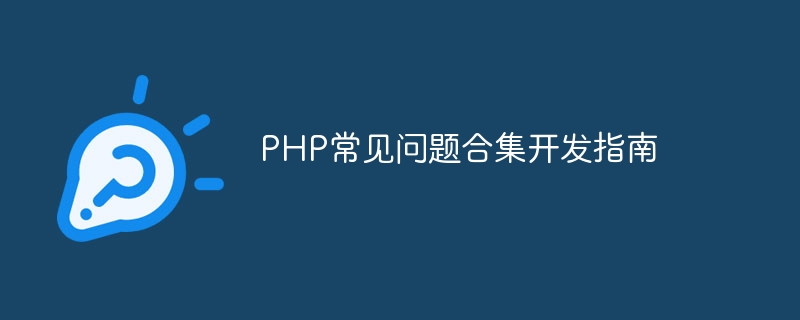Home >Backend Development >PHP Tutorial >PHP FAQ Collection Development Guide
PHP FAQ Collection Development Guide
- WBOYWBOYWBOYWBOYWBOYWBOYWBOYWBOYWBOYWBOYWBOYWBOYWBOriginal
- 2023-09-11 10:39:141081browse

PHP FAQ Collection Development Guide
Introduction:
PHP is a scripting language widely used in Web development. Because of its simplicity, ease of learning, Features such as rapid development, efficiency and stability make it deeply loved by developers. However, during the development process, you will inevitably encounter some common problems, which may affect development efficiency and code quality.
This article aims to provide a collection of frequently asked questions for PHP developers, which contains some frequently encountered problems and corresponding solutions during the development process. We hope that sorting out and answering these questions can help developers better understand and apply PHP and improve development efficiency.
1. PHP running environment configuration issues
- How to configure the PHP running environment?
PHP’s operating environment configuration mainly involves the installation and configuration of the Web server. Common web servers include Apache, Nginx, IIS, etc. Developers can choose the web server that suits them according to their own needs.
- How to configure PHP extension module?
PHP’s extension modules can provide some additional functions and features, and developers can choose to install the corresponding modules according to their own needs. Commonly used extension modules include MySQL, GD, Curl, etc. For installation methods, please refer to the official documentation.
2. PHP syntax and common errors
- How to avoid undefined variable errors?
In PHP, if undefined variables are used, an error will occur. To avoid this error, developers can make judgments before using variables or add error handling mechanisms to the code.
- How to avoid grammatical errors?
PHP's syntax is relatively loose, but there are still some common syntax errors, such as missing semicolons, mismatched brackets, etc. In order to avoid these mistakes, developers should develop good coding habits and pay attention to grammatical specifications and code format.
3. PHP performance optimization issues
- How to improve the execution efficiency of PHP scripts?
The execution efficiency of PHP scripts can be improved through some optimization methods, such as using caching technology, reducing file read and write operations, and avoiding unnecessary database queries. Developers can choose the appropriate optimization method based on specific situations.
- How to avoid memory leak problems?
PHP’s memory management is taken care of by the garbage collection mechanism, but memory leaks may still occur. In order to avoid memory leaks, developers should pay attention to promptly releasing variables and resources that are no longer used, and using memory management functions appropriately.
4. PHP security issues
- How to prevent SQL injection attacks?
There is a risk of SQL injection vulnerability in the database operation functions used by PHP. In order to improve security, developers should use methods such as parameterized queries and input validation to avoid directly splicing SQL statements.
- How to prevent cross-site scripting attacks (XSS)?
Developers should filter and escape user input to prevent the injection of malicious scripts. This can be achieved using built-in functions such as htmlspecialchars().
Conclusion:
This article sorts out and answers common problems in the PHP development process, and provides corresponding solutions. It is hoped that these contents can help developers better understand and apply PHP, and improve efficiency and code quality during the development process. Of course, this article is not exhaustive, and it is worthy of every developer to use it flexibly in actual use, continue to learn and sum up experience, to improve their own PHP development capabilities.
The above is the detailed content of PHP FAQ Collection Development Guide. For more information, please follow other related articles on the PHP Chinese website!

